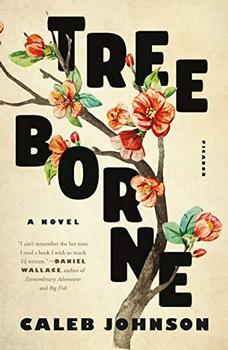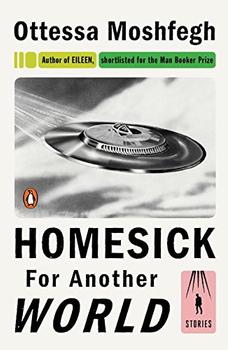Summary | Excerpt | Reading Guide | Reviews | Beyond the book | Read-Alikes | Genres & Themes | Author Bio

Stories
by Karen RussellKaren Russell's new book, Vampires in the Lemon Grove, a collection of short stories, is a well-crafted homage to the grotesque. Russell's earlier book, the novel Swamplandia! about a young girl searching for identity and family in an alligator theme park, was nominated for the Pulitzer Prize. Vampires in the Lemon Grove, comprised of eight stories, further underscores Russell's talent, and ratifies her place on The New Yorker's "20 Under 40" list.
Though each of these stories is radically different from the other, the collection is unified through its debt to Southern Gothic literature, particularly the grotesque, a tradition used by Flannery O'Connor and Carson McCullers. Though referred to as "Southern Gothic" because it was famously and most often used by Southern writers, the concept of creating monstrous settings and/or characters to reveal truths about the human condition can be traced to other authors including Kafka. Russell incorporates the grotesque throughout her collection, at times quite deliberately ("Reeling for Empire" is a stunning, feminized re-imagining of Kafka's "The Metamorphosis," for example), creating a fabulous montage of troubled characters and haunting landscapes.
All the stories include an element of fear or monstrousness. Even the most absurd story, "Dougbert Shackleton's Rules for Antarctic Tailgating," includes a bass tone of gloom. Shackleton's "rules" are humorous and satirical of actual tailgating shenanigans, but the hilarity becomes grim when he makes clear that death is a real possibility while watching Team Krill vs. Team Whale at the bottom of the world. Fear persists in "The Seagull Army Descends on Strong Beach, 1979," when Nal quakes at the legions of seagulls invading his hometown. He wonders if they are trying to send him a message when he discovers key items in their nests, items that have changed the course of people's lives: a lost wedding invitation and a window top screw that cost his mother her job. In "Proving Up," fear advances into horror, as Miles encounters a stranger on his journey through the Nebraska prairie. Upon close inspection, the crop on the stranger's land appears to be human bones. Other stories contain monsters. Clyde in "Vampires in the Lemon Grove" sucks on lemons to slake his thirst for blood. He has lost his ability to fly, a predicament made all the more strained by the fact that his wife likes to masquerade as a bat. Kitsune, in "Reeling for Empire" is also not in her original feminine form, but in her case, transforming into a silkworm was a process begun without her knowledge. As her body makes silk that must be harvested through her fingers, she tries desperately to find an escape. In "The Barn at the End of Our Term," eleven American presidents find themselves alive in horse bodies. "The New Veterans" also contemplates changed bodies, but here a tattoo on an Iraq War veteran's back transmits images of war to the veteran's masseuse. In a story evocative of Flannery O'Connor's haunting tale "Parker's Back," a tattooed image has tremendous power to alter realities.
What saves these stories from feeling too grim is Russell's beautiful writing, which is humorous and full of precise imagery. Russell's collection contains a fair amount of freaks, individuals most would flee from, but she presents them as people with problems. The humor enables our empathy and increases our ability to recognize their humanity. For example, Kitsune, in "Reeling for Empire" struggles to escape the factory and regain her human form, but she observes that one of the girls is insufferable and that another was hairy before she became a silkworm. In "The Seagull Army Descends on Strong Beach, 1979," Nal suffers the indignities of being a teenager while sporting blue hair, a style given to him by Cousin Steve for Steve's Radical Metamorphosis II class in beauty school. Nal hates it, but Cousin Steve refuses to shave it because it would violate "the Hippocratic Oath of Beauty Professionals."
Russell's use of comedy allows these stories to walk the tightrope between high art and fun reading, but her stunning imagery leaves no question that this is excellent writing. Her metaphors are almost jarring in their aptness: turkey heads look like "scratched mosquito bites;" a young woman bumming around a beach bar has bleached hair like "spaghetti;" the ocean undulates like "molten aluminum;" and a character in a blue dress moves down a hill "like a tear." This precise imagery tightens the visual elements of the writing, and the reader is immediately transported to Russell's unusual worlds.
There are many reasons to read Vampires in the Lemon Grove - highly imaginative characters, stunning language, penetrating insights into the human condition, and thought-provoking situations – but the primary reason to read this collection is that it is a great read. Through the incorporation of the grotesque, Russell enables us to re-evaluate what we find bizarre and why. By creating monstrous characters and haunting landscapes, Russell affords us a glimpse into unexplored corners of the human experience. You'll find yourself thinking about these stories long after you have finished reading them.
Listen to an NPR interview with Karen Russell about Vampires in the Lemon Grove.
![]() This review was originally published in The BookBrowse Review in February 2013, and has been updated for the
January 2014 edition.
Click here to go to this issue.
This review was originally published in The BookBrowse Review in February 2013, and has been updated for the
January 2014 edition.
Click here to go to this issue.

If you liked Vampires in the Lemon Grove, try these:

by Caleb Johnson
Published 2019
Treeborne is a celebration and a reminder: of how the past gets mixed up in thoughts of the future; of how home is a story as much as a place.

by Ottessa Moshfegh
Published 2017
An electrifying first collection from one of the most exciting short story writers of our time.
In order to become the master, the politician poses as the servant
Click Here to find out who said this, as well as discovering other famous literary quotes!
Your guide toexceptional books
BookBrowse seeks out and recommends the best in contemporary fiction and nonfiction—books that not only engage and entertain but also deepen our understanding of ourselves and the world around us.